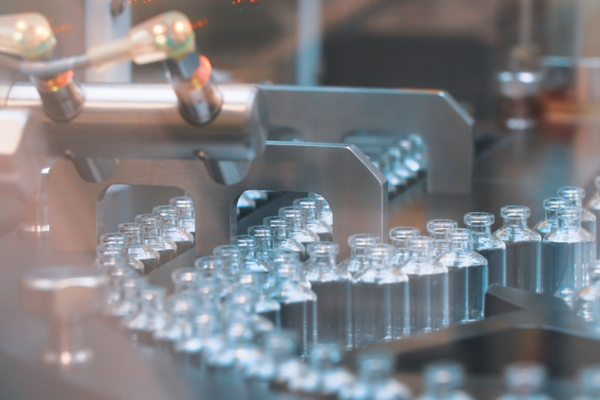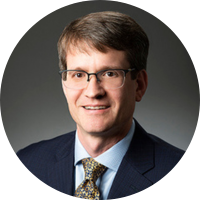
Key Takeaways:
- Bob Maughon’s hopes and fears pertaining to long-term effects of the pandemic
- Maughon shares his keys to success
- Major technology trends soon to sweep the industry
Mike Tyson, the boxer, famously said, “Everybody has a plan until they got punched in the mouth.” We all got a punch in the mouth courtesy of COVID-19. In what ways has that ‘punch’ significantly changed the plans that you began the year with?
Yes, COVID-19 has created new challenges and has undoubtedly impacted our near-term priorities and focus. Although these challenges may have affected the tactical plans for the early part of the year, I believe, however, that the experiences gained here have accelerated the transformation we are undergoing.
After I joined SABIC in April of 2019, I devoted significant time to understanding SABIC’s culture, business strategy, our portfolio, and identifying areas for improvement to strengthen the sustainability, technology & innovation pipeline. This was an exciting period of intense learning, challenge and growth. My team and I were able to bring forward and begin implementation of an ambitious transformation agenda.
Heading into 2020, my new leadership team was energized and moving ahead on all these fronts, and I was excited to continue to engage within all SABIC’s regions to drive our transformation. COVID-19 certainly poses a potential challenge to these plans.
We are dealing with issues like near-term disruption to business travel and engagement with teams, changes in our labs/working environments, protecting the welfare and safety of our employees, sustaining our plant operations, delivering to our customers and maintaining our ability to move innovations in the pipeline forward at the pace we had hoped. However, the collaborative culture across my team, as well across SABIC, has been tremendous and has built a foundation that will only further enable our transformation journey despite these challenges.
What are some “positives” that will emerge from this COVID-19 experience? Both for you personally, and for SABIC as a whole?
On a personal note, this has significantly impacted my travel schedule, providing a unique opportunity to spend much more quality time with my wife Dianne and my children, Andrew and Lauren – however, I am not sure how they will feel about all this “quality” time if this continues for another couple of months!
I think what stands out most to me are not the challenges that COVID-19 has brought, but instead the response of SABIC as a whole, and within my Sustainability, Technology & Innovation team. This experience has demonstrated something to the team better than I ever could have alone - the power and value that our interdependence and collaboration can bring.
As a part of our social responsibility towards global communities, we are collaborating with social organizations, health authorities and local bodies by making monetary and material donations to help overcome this pandemic, totaling around $44 MM so far. SABIC has decided to launch a global donation campaign in support of our communities as well.
In this campaign, we will invite our employees to contribute funds, and the company will match a portion of such funds raised to benefit organizations responding to this challenge. This campaign is a result of the SABIC family’s commitment to its humanitarian duty, and a true reflection of our values as a leader in supporting communities wherever they are, delivering Chemistry That Matters™. Our donations are also providing materials that are high in demand to manufacture: sanitizers, medical equipment, preventive products and supplies, for frontline medical and healthcare workers.
We are learning to engage with each other in unique ways, to support our plants, our customers, and our communities with new innovative solutions through these challenging times, and I have been able to learn much more about my leaders, their strengths and capabilities, and to build a stronger relationship with them as well. Yes, there has been a short-term disruption to our plans for 2020, but I am confident that the experience gained during this period will only accelerate our ability to drive our transformation in SABIC.
What did you learn during your time with Dow (1998-2019) that has been most helpful to you in your first year at SABIC?
Through my 21 years at Dow, I grew from an individual contributor in homogeneous and heterogeneous catalysis research to a project leader, team leader, and ultimately R&D Vice President leading R&D for Dow’s Packaging & Specialty Plastics and Hydrocarbons business.
I spent my initial 10 years in Corporate Research, and the following 11 years working across multiple business units. These varied experiences have had a profound impact on how I view people development, the leadership competencies that I value and hope to nurture in my teams, and most importantly, the role I believe technology organizations should serve to enable business strategy and accelerate growth.
A few points on these areas:
- Talent Development: This is the #1 priority for my leadership team and for leaders throughout the organization. Hiring the best talent and ensuring that we provide an exciting, inclusive, challenging, and impactful environment to retain and develop that talent is essential to successful delivery, and profitable and sustainable business growth.
- Leadership Competencies: I expect my leaders to grow in their focus on people/talent development, transparency and open communication, a willingness to challenge and be challenged, collaboration (with each other, with their business partners, across functions and externally), global leadership capabilities, and business acumen.
- Sustainability, Technology, and Innovation Role: We must enable business growth through developing a balanced technology pipeline that meets the current growth/differentiation needs for the businesses while at the same time anticipating and responding to the business challenges in the future. This requires close collaboration, and alignment, between Business and Corporate Research teams, Technology Licensing and Ventures, and Sustainability to ensure that the pipeline is balanced and aimed at the right priorities.
I’ve noticed that a disproportionally high number of our ACS Boss Talk participants worked at Dow at some point in their careers. Any thoughts on why so many Dow alumni have gone on to CTO-level positions all around the world?
I feel privileged to have had the opportunity to work with, and for, many great leaders during my 21 years with Dow. I think what stands out for me is that through several CTOs, including Bill Banholzer and A.N. Sreeram, there was always a very clear focus on people development and a passion for excellence in delivery, but with collaboration always at the center of this. Driving a culture of excellence, but at the same time demonstrating the importance of collaboration, is essential to a high performing team, and I feel that this environment was enabling for me and many others.
Many of my peers, both those still at Dow and those who have left for other opportunities as you noted, were more friends and collaborators than competitors. Yes, we competed, for access to talent, capital, resources, etc… (and sometimes just for the fun of it), but we valued each other and the impact from working together and strengthening the R&D culture and impact at Dow. Even more importantly, we were rewarded for doing so.
SABIC Headquarters is based in Riyadh, Saudi Arabia. Riyadh is a long way from Midland, Michigan. What are some of the more noteworthy differences between Dow and SABIC in terms of corporate culture?
The change from a US-based chemical company in Dow to SABIC has certainly been an amazing opportunity for cultural learning and growth. With my home base in Houston, balancing heavy travel to Saudi Arabia and working remotely have provided many challenges and learning opportunities. The key to success is to take in every experience, be present when I am with my teams in the regions, to listen to and value the different perspectives brought forward, and to respect the past but be willing to challenge as we move forward.
There are many parallels and similarities. Much like at Dow, I lead a global organization, with 21 research centers across the US, Europe, Asia, and Saudi Arabia, so the normal challenges of working across cultures, time zones, and addressing different asset and market challenges are present and exciting to tackle. In addition, SABIC has a clear focus around growth, both regionally within Saudi Arabia as well as globally, and welcomes new perspectives, different ways of thinking and working, and their growth focus has put a tremendous priority, and pressure, on technology and innovation.
I have been amazed at how warmly I was embraced, by the SABIC Executive Committee and Board of Directors, and at every site that I have visited, always with a rich dialogue on how to drive our technology and innovation transformation. There is a strong and deserving pride for the amazing history and successes that have enabled SABIC’s growth over the last 40+ years, but as well as a recognition that transformation, along with a true passion for delivering new solutions in the market, are essential to thriving through change.
Traveling and working with leaders and teams in Saudi Arabia has provided some unique challenges. Being based in a remote site outside of headquarters means adapting to time zone challenges, significant travel and time in Riyadh, and across Saudi Arabian sites, to build relationships and drive change, and as well adapting to my first two weeks in Riyadh last year during Ramadan. This latter experience was excellent in supporting my diet (excluding the amazing evening feasts), and as well learning great cultural lessons.
How did your parents influence your leadership style?
My father was a psychiatrist, and his focus on asking questions, understanding people and their motives and drivers, and his passion for science had a huge impact on the path that I chose. I disliked being the subject of his analysis at times, but he taught me to recognize and better understand (and value) the styles, perspectives, and drivers of others.
My mother’s passion was art and interior design, but from her I inherited an interest in travel, embracing other cultures, and looking at life as an opportunity for continuous learning. My stepfather was a huge influence in my teen years and beyond – his career in marketing and entrepreneurship brought business more to the forefront, and I think significantly influenced my path in industry vs academics.
What major technology trends are you following with an eye toward how they may impact SABIC’s future business opportunities?
There are a number here, but let me highlight just a few:
- Digitalization – I see modeling and/ digitalization over the next decade as the next step beyond high throughput to accelerate technology delivery in process and product innovation.
- Electric Vehicles – the impact on material needs for the future automotive market.
- 5G – the impact on material needs for the future telecommunications market.
- Advanced Recycling – developments in plastic recycling technologies enabling and developing circular solutions.
- CO2 Management – developments in electrification, renewable energy, and energy storage will be essential to advancing a low carbon footprint for the chemical industry.
Among your scientists at SABIC, what non-technical skills do you most highly value?
There are three areas that I see as critical to advancement and impact:
- Performance: The scientists that can collaborate, within their teams and across all functions, are the ones that can translate their technical acumen into business results – this is the difference between innovation and invention.
- People: Scientists should be devoted to the development of the next generation of scientists, challenging, and supporting younger talents but as well taking ownership in enabling their success. True leadership is not demonstrated through individual achievement, but instead through inspiring, mobilizing, and enabling others.
- Pipeline: Willingness to take risk and bring new ideas forward. All of our researchers have strong technical skills, but those researchers who are willing to speak out, take risks, champion new technologies, and inspire others to join them, are the ones that stand out.
The desired behaviors, expressed in the SABIC Leadership Way, of being a Talent Champion, a Collaboration Partner, an Innovation Pioneer, and an Excellence Driver, are very much aligned to these areas of focus.
What do you view as SABIC’s most consequential sustainability issue? And what is your organization doing to address it?
SABIC, and the broader plastics and chemicals industries, are facing two significant sustainability issues, carbon management and the plastics end of use challenge. However, challenges are not without opportunities - and this is true as we transition from a linear to a circular economy. As this evolution takes place, it represents a systematic shift in the way the chemicals industry conducts business by building long-term resilience, generating greater business and economic opportunities, and providing environmental and societal benefits. A key learning for us has been the need to innovate, and create solutions, that not only achieve the crucial aims of the circular and low carbon economies, but also deliver viable business/economic solutions as well.
Only through innovation and collaboration across the value chain can we realize our ambitions and deliver circular solutions to the market that meet the challenging economic, social, and environmental needs of society. We are the first petrochemical company in the world to commit to scale up the advanced recycling of plastic waste back to the original polymer. By doing this, we are offering customers an important option to help meet ambitious recycling targets and address plastics end of use challenges more broadly.
We are working with our customers, and the broader value chain, to implement new enabling process, product, and application innovations, and as well driving the necessary collaborations and new business models.
This is why, in January this year, we chose the World Economic Forum in Davos as a platform to reveal to global audiences our plans for 2020 for our TRUCIRCLE™ initiative. TRUCIRCLE™ is our umbrella for our circular solutions that span design for recyclability, mechanically recycled products, certified circular products from feedstock recycling of plastic waste streams and certified renewables products from bio-based feedstock.
Industry and value chain collaboration will be essential to success, and this is why we are founding members of the Alliance to End Plastic Waste and the World Economic Forum “Collaborative Innovation for Low-Carbon Emitting Technologies in the Chemical Industry” platform. These relationships, among many other key ongoing partnerships, complement our internal innovation agenda and can help accelerate adoption of breakthrough technologies and business models.
What can the chemical industry do to make the workplace more welcoming and rewarding for women?
The chemical industry itself, i.e., the problems to solve, the roles that are available, and the potential for impact on people, business, and society are not the challenge in my mind. The issue is in how we create an environment where both men and women have an equal opportunity to be challenged, grow, and achieve their ambitions. This is evident in the numbers – the industry is effective at hiring diverse talent, but we need to do better at the development and advancement of that diverse talent through the organization levels.
Removing unconscious bias at all levels of leadership in the organization, making roles open broadly for applicants, enabling flexibility where possible, mentoring (and sponsoring), ensuring diverse interview teams, and as importantly ensuring we push for diverse interview pools, are all essential elements for building a more diverse leadership pipeline with the strongest capabilities. This is how you demonstrate that you value diversity at all levels and ensure that your whole organization sees that they have the opportunity to aspire to and achieve their ambitions.
Specifically, with regard to gender diversity at SABIC, we have the SABIC Women’s Network across our geographies, whose mission is to partner with our business to support the recruitment, retention and professional development of women and connect women locally and globally.
Which of the following four educational experiences is most responsible for your professional success: Elementary/Middle Schools, High School, College, or Post-Grad?
There were a number of experiences that helped to build my interest and passion for science and research, from my early chemistry set mishaps in elementary/middle school, to my independent research project in high school, to the opportunity given to me my freshman year to work in a research lab afternoon/evenings with Professor Billups at Rice. This latter experience, which I did throughout college, was what led me to drop my Pre-Med intentions and explore a future in chemistry (and more importantly to meeting my future wife, Dianne!).
However, my experience as a PhD student with Bob Grubbs at Caltech was the most influential in developing the skills that helped me succeed at Dow and now SABIC. His focus on collaboration and targeting industrially relevant research challenges, as well as the freedom he gave me to develop while in graduate school, were essential. He supported my failures and embraced successes, only engaging when necessary and providing space for me to learn and lead through my research – this had a profound impact on my development.

Bob Maughon is the Executive Vice President, Sustainability, Technology & Innovation and Chief Technology and Sustainability Officer at SABIC. He oversees a global organization with 21 research centers around the world and a talented team focused on driving process, product and application innovation to support SABIC’s growth agenda. Additionally, Maughon has responsibility for Corporate Sustainability, Product Stewardship, Technology Licensing and Technology Ventures.
Prior to joining SABIC in 2019, Maughon served the R&D vice president for Packaging & Specialty Plastics and Hydrocarbons at Dow. Early in his career with Dow, he worked in the Corporate R&D laboratories on a variety of programs ranging from heterogeneous hydrogenation catalysis, ring opening polymerization, homogeneous catalysis and alternative feedstocks. Over the course of his 21-years with Dow, Maughon moved from an individual contributor to eventually assuming people leadership roles in Corporate R&D and subsequently Business R&D for Hydrocarbons and Energy, Dow Pharma & Food Solutions, and Packaging & Specialty Plastics and Hydrocarbons.
Maughon serves as a board member for the University of Michigan Engineering Leadership Advisory Board. He holds nine U.S. Patents and has numerous publications and presentations at external conferences.
Maughon earned his BA degree in chemistry from Rice University and his PhD in organic chemistry from the California Institute of Technology.
Bob lives in Houston, Texas with his wife Dianne and two children, Andrew and Lauren. His hobbies include travel, cooking and running, recently completing his first marathon early in 2020.
Copyright 2022 American Chemical Society (All Rights Reserved)






